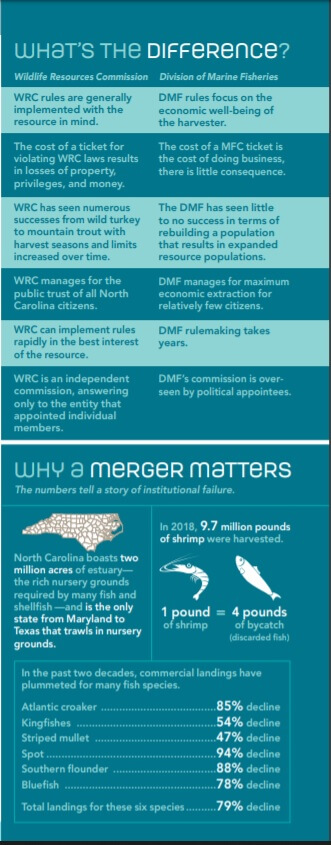One Mission, One Commission: 6 reasons N.C. needs a united fish and wildlife agency

 Efficiency and science-based management are critical aspects of any professional natural resource management program. North Carolina has two agencies with this responsibility, the North Carolina Wildlife Resource Commission (WRC) and Division of Marine Fisheries (DMF). While their missions are closely aligned, having two separate management entities creates duplication, ambiguity, redundancy and inefficiency.
Efficiency and science-based management are critical aspects of any professional natural resource management program. North Carolina has two agencies with this responsibility, the North Carolina Wildlife Resource Commission (WRC) and Division of Marine Fisheries (DMF). While their missions are closely aligned, having two separate management entities creates duplication, ambiguity, redundancy and inefficiency.
Remaking the landscape of marine fisheries conservation in North Carolina is long overdue. Late last year, NCWF’s board of directors passed a resolution called One Mission, One Commission that recommended the consolidation of WRC and DMF for better management of our natural resources.
NCWF hosted a conference call on One Mission, One Commission in early July. You can listen to the full recording here.
We also dedicated a lot of ink to this contentious topic in our Winter 2020 and Spring 2020 Journals. The articles take a deep dive into our position, but if you want to skim the surface, here are six reasons why it is essential to bring wildlife management in North Carolina under one umbrella: The Fisheries and Wildlife Resources Commission.
- It will streamline or eliminate duplicate management functions and responsibilities within agencies. This includes law enforcement, aerial units, biological sampling, public input, rulemaking, regulatory processes and routine administrative functions, such as purchasing, record keeping, human resources, legal representation and license sales.
- Economics shouldn’t be the priority in fish and wildlife management. There are two basic principles for managing public trust natural resources: Fish and wildlife are a “public trust resource,” meaning they belong to all citizens and must be managed in a way that ensures sustainable populations. WRC generally implements rules with the resource in mind, with violation tickets resulting in property, privilege or financial loss. On the other hand, DMF’s rules focus on harvests with very little consequence for those who violate the law.
- Less red tape means swift and timely decision-making. WRC is an independent agency. Commissioners don’t have mandated financial incentives, which means they can quickly implement rules in the best interest of the resource. Because political appointees oversee the DMF commission, rulemaking and implementation of management measures is complicated, convoluted and grossly time-consuming. It is not uncommon for management debates to take years. Meanwhile, the resource suffers.
- Fish species don’t need to be co-managed. To spawn or grow, some species must travel through DMF-managed coastal waters to reach WRC-managed inland waters. The DMF approach centers on maintaining harvests at maximum levels. On the other hand, WRC focuses on best management practices that focus on abundant, high-quality fisheries rather than short-term economic impacts.
- North Carolina is failing at sustainability. If we continue with today’s commercial and recreational fishing practices, our state’s marine resources will diminish until there’s nothing left. In fact, that process is well on the way, as any biologist or longtime North Carolina angler can tell you. Sustaining healthy fish populations and functioning ecosystems of inland waters requires scientifically sound and economically forward-thinking stewardship.
- Political self-interest has no place in natural resource management. Trained biologists and statisticians base recommendations for marine fisheries conservation and management on scientific research and analysis. Yet, DMF commissioners who represent special interests consistently reject these management options.


